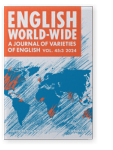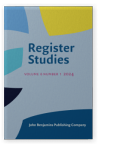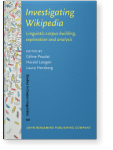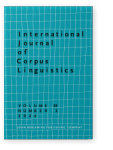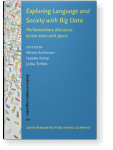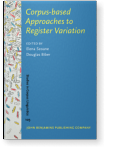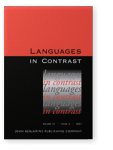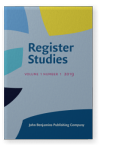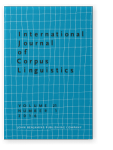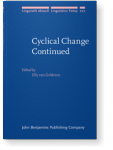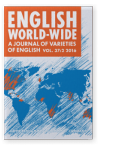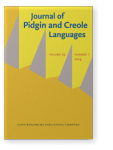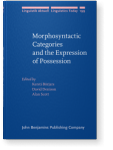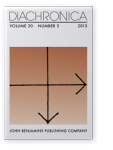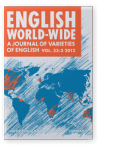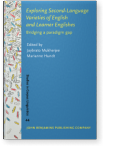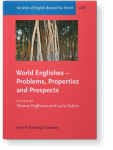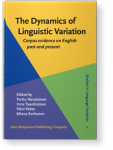Benedikt Szmrecsanyi
List of John Benjamins publications for which Benedikt Szmrecsanyi plays a role.
Journals
Book series
2024 Future-time reference in spoken EFL: More complex than in ENL? Journal of Second Language Studies: Online-First Articles | Article
Previous research has given much attention to how native speakers of English and, to a lesser extent, speakers of World Englishes, choose between will and be going to to talk about the future. There is, however, a lack of research investigating how learners of English as a Foreign Language… read more
2024 Constraints and lexical conditioning in the dative alternation: A cross-linguistic analysis of English and Dutch Languages in Contrast: Online-First Articles | Article
This article presents a cross-linguistic variationist study of the dative alternations in English (I gave Tom a present vs. I gave a present to Tom) and Dutch (Ik gaf Tom een cadeau vs. Ik gaf een cadeau aan Tom). We use logistic mixed-effects regression and lasso regression to assess the… read more
2024 Modeling the locative alternation in Mandarin Chinese: A corpus-based study International Journal of Corpus Linguistics 29:2, pp. 258–285 | Article
The current study investigates the probabilistic conditioning of the Mandarin locative alternation. We adopt a corpus-based multivariate approach to analyze 2,836 observations of locative variants from a large Chinese corpus and annotated manually for various language-internal and… read more
2024 Variation-Based Distance and Similarity Modeling: A new way of measuring distances between registers Register Studies 6:1, pp. 31–59 | Article
We present a corpus-based method — Variation-Based Distance and Similarity Modeling (VADIS) — that calculates distances between registers as a function of the extent to which the probabilistic conditioning of variation differs across registers. When language users have a choice between different… read more
2023 Chapter 9. Processing and prescriptivism as constraints on language variation and change: Relative clauses in British and Australian English parliamentary debates Exploring Language and Society with Big Data: Parliamentary discourse across time and space, Korhonen, Minna, Haidee Kotze and Jukka Tyrkkö (eds.), pp. 250–276 | Chapter
We investigate the choice between the relative markers which and that in 8,283 restrictive relative clauses on subject position, with inanimate antecedents, in a written corpus consisting of British and Australian Hansard materials over five sampling years (1901, 1935, 1965, 1995, 2015). Our aim… read more
2021 Chapter 3. How register-specific is probabilistic grammatical knowledge? A programmatic sketch and a case study on the dative alternation with give Corpus-based Approaches to Register Variation, Seoane, Elena and Douglas Biber (eds.), pp. 51–84 | Chapter
While there is preliminary evidence about the importance of register in linguistic choice-making processes, systematic studies focusing on the interaction between register and language-internal constraints are lacking in variationist linguistics. This contribution sketches an ongoing project in… read more
2021 Mapping Eurolects: An aggregate perspective on similarities between legislative varieties Languages in Contrast 21:2, pp. 186–216 | Article
Based on the description of EU legislative varieties covering EU directives and their national laws of implementation in 11 languages, we are interested in the extent to which Eurolects are similar to each other, above and beyond trivial genealogical similarities. We thus utilise a… read more
2019 Register in variationist linguistics Register Studies 1:1, pp. 76–99 | Article
Benedikt Szmrecsanyi, Professor of Linguistics in the Quantitative Lexicology and Variational Linguistics research group at the Katholieke Universiteit (KU) Leuven, writes this article exploring the connections between register and variationist linguistics. He is involved with various… read more
2016 A lectometric analysis of aggregated lexical variation in written Standard English with Semantic Vector Space models International Journal of Corpus Linguistics 21:1, pp. 48–79 | Article
Lectometry is a corpus-based methodology that explores how multiple language-external dimensions shape language usage in an aggregate perspective. The paper combines this methodology with Semantic Vector Space modeling to investigate lexical variability in written Standard English, as sampled in… read more
2016 An analytic-synthetic spiral in the history of English Cyclical Change Continued, Gelderen, Elly van (ed.), pp. 93–112 | Article
Drawing on techniques familiar from quantitative morphological typology (Greenberg 1960), this contribution marshals usage- and frequency-based, aggregative measures of grammatical analyticity and syntheticity to profile the history of grammatical marking in English between circa AD 1100 and AD… read more
2016 Around the world in three alternations: Modeling syntactic variation in varieties of English English World-Wide 37:2, pp. 109–137 | Article
We sketch a project that marries probabilistic grammar research to scholarship on World Englishes, thus synthesizing two previously rather disjoint lines of research into one unifying project with a coherent focus. This synthesis is hoped to advance usage-based theoretical linguistics by adopting… read more
2014 Measuring analyticity and syntheticity in creoles Journal of Pidgin and Creole Languages 29:1, pp. 49–85 | Article
Creoles (here including expanded pidgins) are commonly viewed as being more analytic than their lexifiers and other languages in terms of grammatical marking. The purpose of the study reported in this article was to examine the validity of this view by measuring the frequency of analytic (and… read more
2013 The great regression: Genitive variability in Late Modern English news texts Morphosyntactic Categories and the Expression of Possession, Börjars, Kersti, David Denison and Alan K. Scott (eds.), pp. 59–88 | Article
Utilizing the variationist method, this contribution is concerned with the alternation between the s-genitive (the president’s speech) and the of-genitive (the speech of the president) in Late Modern English news prose as sampled in ARCHER. A frequency analysis reveals that text frequencies of the… read more
2013 Dative and genitive variability in Late Modern English: Exploring cross-constructional variation and change Diachronica 30:3, pp. 382–419 | Article
We present a cross-constructional approach to the history of the genitive alternation and the dative alternation in Late Modern English (AD 1650 to AD 1999), drawing on richly annotated datasets and modern statistical modeling techniques. We identify cross-constructional similarities in the… read more
2012 Animacy in early New Zealand English English World-Wide 33:3, pp. 241–263 | Article
The literature suggests that animacy effects in present-day spoken New Zealand English (NZE) differ from animacy effects in other varieties of English. We seek to determine if such differences have a history in earlier NZE writing or not. We revisit two grammatical phenomena — progressives and… read more
2011 Typological profiling: Learner Englishes versus indigenized L2 varieties of English Exploring Second-Language Varieties of English and Learner Englishes: Bridging a paradigm gap, Mukherjee, Joybrato and Marianne Hundt (eds.), pp. 167–188 | Article
Drawing on naturalistic corpus data, this study is an exercise in establishing typological profiles of learner varieties (as sampled in the International Corpus of Learner English) vis-à-vis indigenized L2 varieties of English (as represented in the International Corpus of English), though we also… read more
2009 World Englishes between simplification and complexification World Englishes – Problems, Properties and Prospects: Selected papers from the 13th IAWE conference, Hoffmann, Thomas and Lucia Siebers (eds.), pp. 265–286 | Article
This paper offers a broad empirical morphosyntactic study contributing to three debates in linguistics, one of long standing (the so-called equi-complexity axiom), the other two rather more recent, namely McWhorter’s claim (2001 a, b, 2007) that (pidgins and) creoles have the simplest grammars, and… read more
2008 Probabilistic determinants of genitive variation in spoken and written English: A multivariate comparison across time, space, and genres The Dynamics of Linguistic Variation: Corpus evidence on English past and present, Nevalainen, Terttu, Irma Taavitsainen, Päivi Pahta and Minna Korhonen (eds.), pp. 291–309 | Article
This is a paper about language variation and about language change, investigating the competition between the s-genitive and the of-genitive in Modern English (written and spoken, British and American) as a case study. Drawing on a range of spoken and written corpora and considering a multivariate… read more
